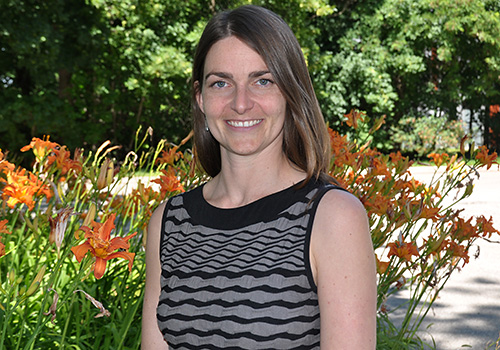 Georgia Simms
Georgia Simms
Linking research and dance is no easy feat, but Georgia Simms’ feet have done just that, playing many roles as a professional dancer on stage. In a recent collaboration with a New York-based choreographer who worked with brain researchers, Simms performed as a neuron in the brain.
In her new role as the engaged practitioner in residence with the Community Engaged Scholarship Institute (CESI), Simms will work with faculty and students across U of G to develop ways to integrate creativity into their research, teaching and learning through dance, theatre and other art forms. Her work aims to foster knowledge mobilization and community participation.
After taking a course at the International Centre for Art for Social Change in Vancouver, Simms was inspired to try similar approaches in Guelph. “I can do this too: try to bring those worlds of social science and art closer together by using tools and methods that we use in the studio in an academic educational context.”
She stresses that she’s not using art to make light of serious topics. “It is possible to find meaningful discovery together, even with difficult themes,” she says. “I like to call it ‘serious games’ where you can creatively explore significant themes and issues that you’re all dealing with on a daily basis but don’t necessarily get to talk about.” These methods are effective in areas such as restorative justice, health care and conflict resolution.
Simms gives an example of a research-based theatre project about dementia that aims to help health professionals and caregivers explore the challenges of those living with dementia and those who care for them. Rather than focus on the disease itself, the performance focuses on the experiences of the people it affects. Watching the play offers different perspectives than reading a journal article about dementia, says Simms, and can impact those who have first-hand experience with the disease and those who study it.
A focus of her residency with CESI is the role that artistic processes can play in community building. For example, one of her previous collaborative projects involved discussions and focus groups with community members as part of a research agenda. She transformed parts of the final report into a dance performance. “We generated movement from the discussions that we then used in the piece,” she says. “Movement came from stories and experiences about civil-municipal relations through workshops and rehearsals.”
Simms sees opportunities for community involvement in other ways besides dance, where people can contribute to performance-based projects by writing poetry or helping with set design, lighting or costumes — and they don’t always need to be professional artists. She says people who participate in arts-based learning experiences benefit from the process, which can lead to further discussion and dialogue.
A U of G graduate, Simms studied international development as an undergraduate and geography for her master’s degree. She also works as a professional dancer for Dancetheatre David Earle, a Guelph-based dance company. Her own creative enterprise is known as IMAGEO artworks. She will serve as the engaged practitioner in residence until the end of the winter 2016 semester
At U of G, Simms is working with Prof. Carla Rice, Canada Research Chair in Care, Gender and Relationships, on a digital storytelling project featuring videos and other artwork by people living with disability or differences. “That is a key piece of social science: to explore how we can work together to shift cultural perceptions of disability or differences,” says Simms. She’s also working with other faculty to incorporate art into their classes to complement or expand the scope of what they’re teaching.
Simms hopes to inspire further appreciation for art through its application and relevance to social science. “It can connect people to a more emotional view of things and put that form of knowledge back into the equation,” she says. “It’s something that can transform a learner toward sympathy or empathy or compassion. Sometimes the way to get to those capacities is through really leveling human experience to something common.”